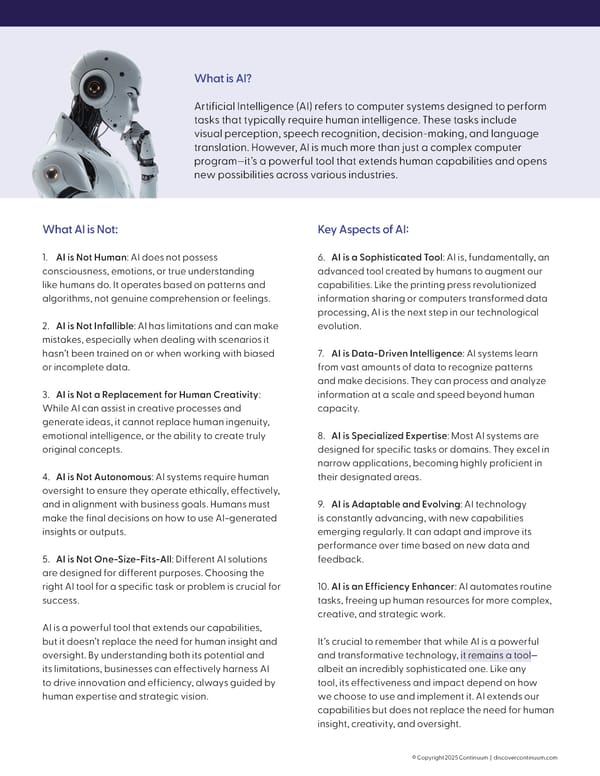What is AI? Artificial Intelligence (AI) refers to computer systems designed to perform tasks that typically require human intelligence. These tasks include visual perception, speech recognition, decision-making, and language translation. However, AI is much more than just a complex computer program—it’s a powerful tool that extends human capabilities and opens new possibilities across various industries. What AI is Not: Key Aspects of AI: 1. AI is Not Human: AI does not possess 6. AI is a Sophisticated Tool: AI is, fundamentally, an consciousness, emotions, or true understanding advanced tool created by humans to augment our like humans do. It operates based on patterns and capabilities. Like the printing press revolutionized algorithms, not genuine comprehension or feelings. information sharing or computers transformed data processing, AI is the next step in our technological 2. AI is Not Infallible: AI has limitations and can make evolution. mistakes, especially when dealing with scenarios it hasn’t been trained on or when working with biased 7. AI is Data-Driven Intelligence: AI systems learn or incomplete data. from vast amounts of data to recognize patterns and make decisions. They can process and analyze 3. AI is Not a Replacement for Human Creativity: information at a scale and speed beyond human While AI can assist in creative processes and capacity. generate ideas, it cannot replace human ingenuity, emotional intelligence, or the ability to create truly 8. AI is Specialized Expertise: Most AI systems are original concepts. designed for specific tasks or domains. They excel in narrow applications, becoming highly proficient in 4. AI is Not Autonomous: AI systems require human their designated areas. oversight to ensure they operate ethically, effectively, and in alignment with business goals. Humans must 9. AI is Adaptable and Evolving: AI technology make the final decisions on how to use AI-generated is constantly advancing, with new capabilities insights or outputs. emerging regularly. It can adapt and improve its performance over time based on new data and 5. AI is Not One-Size-Fits-All: Different AI solutions feedback. are designed for different purposes. Choosing the right AI tool for a specific task or problem is crucial for 10. AI is an Efficiency Enhancer: AI automates routine success. tasks, freeing up human resources for more complex, creative, and strategic work. AI is a powerful tool that extends our capabilities, but it doesn’t replace the need for human insight and It’s crucial to remember that while AI is a powerful oversight. By understanding both its potential and and transformative technology, it remains a tool— its limitations, businesses can effectively harness AI albeit an incredibly sophisticated one. Like any to drive innovation and efficiency, always guided by tool, its effectiveness and impact depend on how human expertise and strategic vision. we choose to use and implement it. AI extends our capabilities but does not replace the need for human insight, creativity, and oversight. © Copyright 2025 Continuum | discovercontinuum.com
 AI for Business: A Comprehensive Guide to Boosting Efficiency and Innovation Page 2 Page 4
AI for Business: A Comprehensive Guide to Boosting Efficiency and Innovation Page 2 Page 4